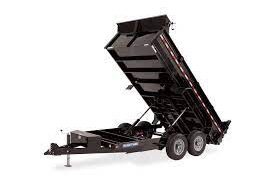Transporting cars from one location to another requires the use of specialized trailers designed for hauling vehicles. Whether you are a car enthusiast, a dealership owner, or a business involved in car transportation, having a comprehensive understanding of the different types of trailers available is essential. In this article, we will provide a comprehensive overview of trailers for hauling cars, discussing their types, features, advantages, and considerations.
1. Open Car Trailers:
Open car trailers are the most common and economical option for hauling cars. They feature a flatbed design with no roof or sides, allowing easy loading and unloading of vehicles. Open trailers provide good visibility and airflow, making them suitable for short to medium-distance transports. However, they offer minimal protection from the elements and limited security.
2. Enclosed Car Trailers:
Enclosed car trailers offer complete protection for the vehicles being transported. They feature walls, a roof, and sometimes a rear door for easy access. Enclosed trailers provide superior security, protecting vehicles from theft, vandalism, and weather conditions. They are ideal for long-distance transports or hauling high-value cars that require extra care and protection. However, enclosed trailers are generally more expensive than open trailers and may have reduced visibility.
3. Flatbed Trailers:
Flatbed trailers provide versatility for hauling cars of various sizes and types. They feature a flat, open platform without walls or a roof. Flatbed trailers are ideal for oversized vehicles, custom-built cars, or specialty vehicles that cannot fit within the dimensions of enclosed or open trailers. They offer easy loading and unloading and allow for customized configurations. However, flatbed trailers do not provide weather protection, and the lack of sides may require additional securing measures.
4. Tilt Trailers:
Tilt trailers are designed with a tilting bed or platform, allowing easy loading and unloading of vehicles. The bed can be hydraulically or manually tilted to create a ramp for vehicle access. Tilt trailers eliminate the need for additional ramps or equipment, making them convenient for loading low-clearance vehicles. However, they may have weight limitations and are not suitable for large or heavy vehicles.
5. Car Dolly Trailers:
Car dolly trailers are lightweight trailers used for towing cars behind another vehicle, typically an RV or a truck. They consist of a small platform with two wheels, onto which the front wheels of the towed vehicle are placed. Car dolly trailers are affordable and space-saving, making them popular for short-distance transports. However, they require the towed vehicle’s front wheels to be off the ground and do not accommodate all-wheel drive or four-wheel drive vehicles.
Considerations for Choosing a Trailer:
When selecting a trailer for hauling cars, several factors should be considered:
- Weight and Towing Capacity: Ensure that your towing vehicle has the capacity to tow the loaded trailer and vehicles. Consult the vehicle’s towing specifications and consider the weight distribution to ensure safe towing.
- Trailer Size and Capacity: Evaluate the size and capacity of the trailer to ensure it can accommodate the number and size of vehicles you plan to haul.
- Security and Protection: Assess the security features provided by the trailer, such as lockable doors, sturdy tie-down points, and theft-deterrent mechanisms. Consider the level of weather protection required for the type of vehicles being transported.
- Durability and Construction: Choose a trailer built with durable materials and construction to withstand the rigors of frequent use. Look for trailers with robust frames, corrosion-resistant components, and reliable braking systems.
- Licensing and Legal Requirements: Familiarize yourself with local regulations regarding trailer dimensions, weight limits, lighting requirements, and licensing. Ensure compliance with all legal requirements to avoid potential penalties
Conclusion:
Selecting the right trailer for hauling cars is crucial to ensure the safe and efficient transportation of vehicles. Consider factors such as trailer type, security features, durability, weight and towing capacity, and legal requirements when making your decision. Each type of trailer offers specific advantages and considerations, so choose the one that aligns with your hauling needs and provides the necessary level of protection for the vehicles being transported. With the right trailer, you can transport cars with confidence and peace of mind.



































